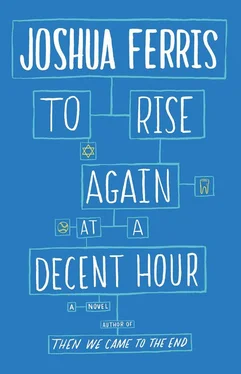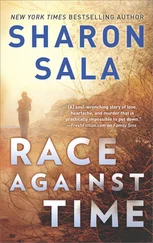So I asked her one time, I said, “Okay, Betsy.”
We were having dinner at an Olive Garden in a mall in New Jersey. She was sipping her customary glass of Chardonnay, I was on my fourth beer. I liked going to the Olive Garden now and then. It reminded me of my childhood. I liked going to the mall for the same reason. I no longer went to the mall to buy things, as Mrs. Convoy did. Nowhere in America would I find that one thing I had not yet purchased at least once in my life. No, I was done buying, I was done wanting. Wanting all the time, for everything, it’s numbing. But I still went to the mall with Mrs. Convoy. In the vast whirring spaces of a mall, overlooking the sloping carpeted ramps, I felt at home more than I did anywhere in Manhattan. Whenever I was homesick or nostalgic, when others left for Long Island or upstate New York, I visited the malls in New Jersey and sometimes went as far as the King of Prussia Mall outside Philadelphia, where I walked the wide aisles with the hordes and bargain hunters. I liked nothing more than to sit on a bright mesh bench in the middle of all that sack rustle and watch people come and go from the Foot Locker, I liked nothing more than to stroll along the kiosks of sunglasses and affordable jewelry, I liked nothing more than a food court. Here is where, growing up, I had made the most of things. Here at the mall every August my mother bought me back-to-school clothes, here at Christmastime I coveted the toys we couldn’t afford, here I filled my empty summer hours with something more than strife and television and the smell of dogs. The mall was always beckoning, and I had wandered it with purpose. The mall itself was my purpose. If I had a few coins to scratch together, I could turn them into a Coke or a high score on a video game or an illicit smoke in the parking lot. And now a mall returned me to a time when desire was easy to resolve. Look, it was still working for so many of them! There they were, with their lists and missions, their handbags and gift cards, moving with oblivion in and out of the stores. A mall can make you feel alive again if you go there only to watch and if you watch without judgment, looking kindly upon the concerted shoppers, who have no choice about buying or not buying, it would seem, and who would not want that choice — not if it meant no longer knowing what to want.
“According to you,” I said to Mrs. Convoy at the Olive Garden, “and correct me if I’m wrong here, but according to you, the only way into the kingdom of heaven is through belief in Jesus Christ. Now Connie, as you know, is Jewish. Her whole family is. Which means, among other things, they reject Jesus Christ as their Lord and Savior. And I happen to be very fond of the Plotzes,” I said to her. “I’ve never met a family like theirs before. There’s about four hundred of them, while in my family, there was just the three of us, and then, kaplow , just the two. But anyway, you would, if I’m not mistaken, have the Plotzes burn in hell because they don’t accept the divinity of Jesus Christ. Is that correct?”
Mrs. Convoy sipped her Chardonnay, then set the glass down, reclined back in her chair, and narrowed her eyes at me.
“It’s not a trick question,” I said. “You insist, do you not, that Connie, with all her family, will be pitched into the boiling waters of hell upon death because they don’t believe in Christ.”
“How do you know,” she asked me, leaning forward, whispering her thoughtful reply across the table, a reply that chilled me to the bone, “how do you know that at the very last second of Connie’s life, Jesus Christ doesn’t open her heart and she converts?”
For the record: I did not become an atheist to be smug. I did not become an atheist so that I could stand above believers and shout my enlightenment down at them. I become an atheist because God didn’t exist. The only god I cared to entertain, which came to mind in the Olive Garden when Mrs. Convoy confided in me her private solution to the Jewish problem, had personally approved a bumper sticker I once saw on the back of an old Saab parked in downtown Boston. BELIEVERS MADE ME AN ATHEIST, it read.
“Why am I doing this to you?” he wrote at last. “Because you’re lost.”
“Lost?” I replied.
What business is it of yours if I’m lost? You don’t know me. You’re just saying things to make me think you do. The most obvious things. All that stuff about being alive inside my head, feeling intensely though no one knows it — that’s so obvious. This is some kind of scam you’re running and I want to know why. Unless it’s you, Betsy. Is it you? Connie, is this you?
I promise you, Paul. It’s no scam. Please, be patient. I know it must be uncomfortable for someone to pop up out of nowhere and diagnose your troubles with pinpoint accuracy. I don’t think you’re an animal in a cage — far from it. You’re the full measure of a man, thoroughly contemporary, at odds with the American dream of upward mobility and its empty material success, and in search of real meaning for your life. I should know, Paul, I was there once, too. In fact, you might even say that you and I are one and the same.
As I was reading, I had the feeling that something was off. An unease just under the skin. I had the weird sensation that he was in the room with me. Or on a computer on the other side of the wall. I looked closely at his email address.
“He’s writing to me under my own name,” I said.
“Who is?”
“He’s created an email in my name. This person… or… program… whatever it is who… he’s pretending to be me in his private correspondence. He sent me an email from myself.”
I looked up. I had said all of this to Mrs. Convoy.
“Who are you talking about?”
If I didn’t know from her physical proximity when the email from “Paul C. O’Rourke” landed in my in-box that it was not Mrs. Convoy, I knew it from her guileless and unblinking stare.
“I don’t know,” I said.
A few days later Connie came up to me and said, “Have you really never used Twitter before?”
“No,” I said. “I’ve really never used Twitter before.”
“How many characters do you have to work with?”
“In Twitter?”
“Yes, in Twitter.”
“A hundred and forty.”
“So you know that much.”
“I didn’t just fall off the turnip truck, Connie. Everyone knows that much.”
“Have you been following your tweets the last couple of days?”
“Kari Gutrich told me not to engage.”
“Who’s Kari Gutrich?”
“Kari Gutrich, Esquire. Talsman’s cyberlaw expert. She said engaging could only make things worse. So that’s what I’m doing, not engaging.”
“You mean you’re just going to let someone say whatever he wants in your name and not even keep track of it?”
“That lawyer was very frightening,” I said. “I don’t want to make matters worse than they already are.”
“You’re not going to make them worse just by looking.”
“I don’t know that. I don’t know how the Internet works.”
“What do you mean you don’t know how the Internet works? You’re on your phone every five seconds.”
“That’s you! That’s not me! That’s you!”
She took a step back using only her neck. “Okay,” she said, “calm down.”
“We couldn’t go to dinner without you spending half the meal reading your goddamn phone!”
“Okay, okay, I know,” she said. “We’ve cataloged my failings. I checked my phone too often. Can we move on?”
She looked down at the iPad in her hand. I could see that she was on Twitter, not because I was a Twitter user, but because I sometimes went to Twitter to read boggswader’s pithy commentaries and Owen from Brookline’s statistical revelations.
Читать дальше












